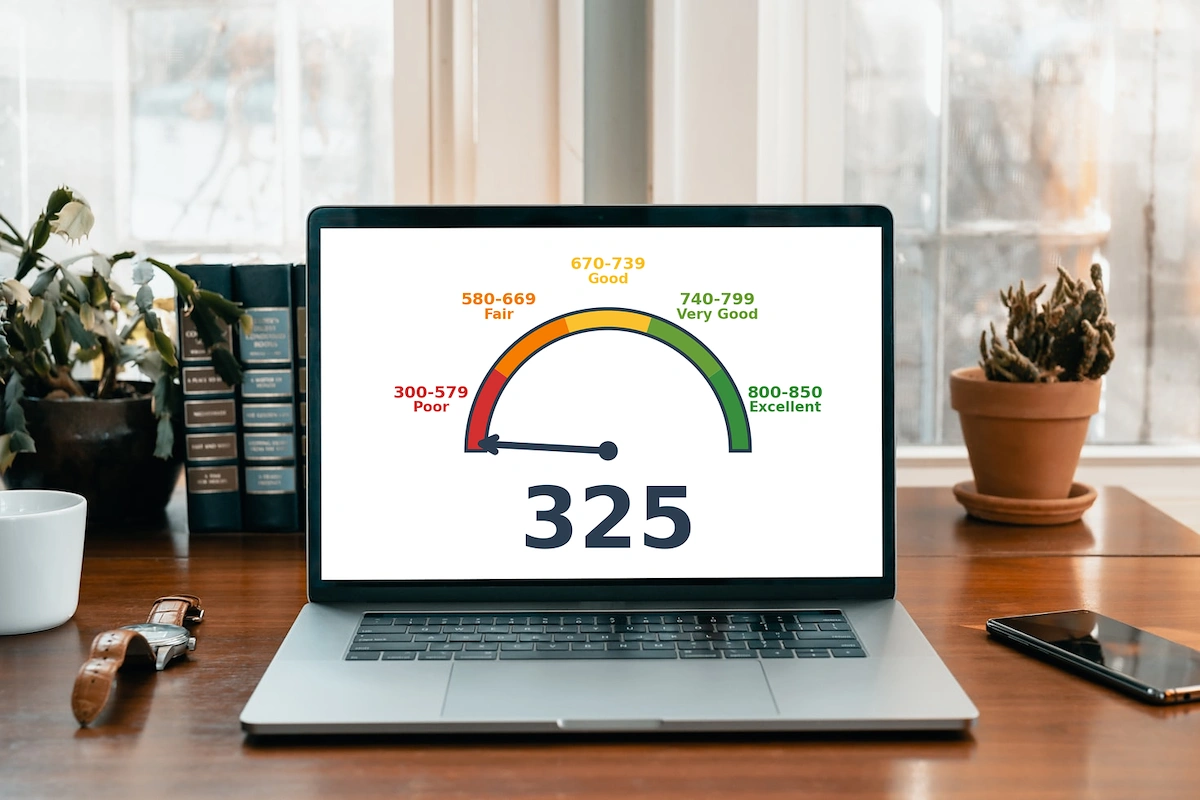
Kudos has partnered with CardRatings and Red Ventures for our coverage of credit card products. Kudos, CardRatings, and Red Ventures may receive a commission from card issuers. Kudos may receive commission from card issuers. Some of the card offers that appear on Kudos are from advertisers and may impact how and where card products appear on the site. Kudos tries to include as many card companies and offers as we are aware of, including offers from issuers that don't pay us, but we may not cover all card companies or all available card offers. You don't have to use our links, but we're grateful when you do!
325 Credit score: What You Need to Know in 2025
July 1, 2025


TL;DR
A 325 credit score offers a clear opportunity for financial growth and improvement. According to the FICO scoring model, a score in this range is considered "Poor," providing a solid baseline from which to build.
What Does a 325 Credit Score Mean?
A credit score of 325 places you at the lower end of the credit spectrum. FICO scores, one of the most widely used scoring models, range from 300 to 850. A score of 325 falls squarely into the "poor" category, signaling to lenders a history of significant financial missteps or a very limited credit history. It's a number that reflects a very high level of risk from a lender's perspective.
Financially, this score can create major hurdles. You'll likely face rejections for new credit cards, mortgages, and auto loans. If you are approved for any form of credit, it will almost certainly come with very high interest rates and unfavorable terms. While this position presents serious obstacles, it's important to understand that credit scores are not permanent and can change over time.
Who Has a 325 Credit Score?
- Generation Z (ages 18-26): The average FICO score is 680.
- Millennials (ages 27-42): The average FICO score is 690.
- Generation X (ages 43-58): The average FICO score is 709.
- Baby Boomers (ages 59-77): The average FICO score is 745.
- Silent Generation (ages 78+): The average FICO score is 760.
This generational breakdown shows a clear trend where average credit scores tend to increase with age, largely due to factors like a longer credit history and more time to establish a record of on-time payments.
Credit Cards With a 325 Credit Score
A credit score of 325 is considered very poor and will significantly limit your options when applying for a credit card. Most lenders view this score as a high risk, making it highly unlikely you'll be approved for traditional, unsecured credit cards. Your best bet will likely be secured credit cards or specific cards designed for individuals with bad credit, which often come with lower credit limits and higher fees.
Kudos uses AI-powered tools that ask about your preferences or analyze your spending habits to find a card that fits your financial goals. The platform then provides personalized recommendations from its database of nearly 3,000 cards, giving you insights into potential credit score impacts and helping you build credit responsibly.
Auto Loans and a 325 Credit Score
A 325 credit score places you in the deep subprime category, which can make securing an auto loan challenging. While approval is still possible, you will likely face significantly higher interest rates and less favorable loan terms.
According to a 2025 analysis, average auto loan rates vary significantly based on credit score brackets:
- Super-prime (781-850): 5.25% for new cars and 7.13% for used cars.
- Prime (661-780): 6.87% for new cars and 9.36% for used cars.
- Non-prime (601-660): 9.83% for new cars and 13.92% for used cars.
- Subprime (501-600): 13.18% for new cars and 18.86% for used cars.
- Deep subprime (300-500): 15.77% for new cars and 21.55% for used cars.
Mortgages at a 325 Credit Score
With a 325 credit score, qualifying for a traditional mortgage is highly unlikely. Most lenders have minimum credit score requirements that are significantly higher. For example, FHA loans, one of the most accessible options, require a score of at least 500 with a 10% down payment. Conventional loans typically require a minimum score of 620. A score of 325 falls well below the threshold for even the most lenient government-backed programs.
If you were to find a specialized subprime lender willing to consider your application, the loan terms would be extremely unfavorable. You would face exceptionally high interest rates, substantial fees, and a large down payment requirement. According to mortgage experts, alternative financing options like owner financing also carry significant risks and should be approached with caution.
What's in a Credit Score?
Understanding your credit score can feel like trying to solve a complex puzzle, as it's a blend of several key financial habits. The most common factors that determine your score include:
- Your payment history tracks whether you have paid past credit accounts on time.
- Credit utilization is the percentage of your available credit that you are currently using.
- The length of your credit history considers the age of your oldest account and the average age of all your accounts.
- Credit mix refers to the variety of credit products you have, such as credit cards, retail accounts, and loans.
- New credit inquiries and recently opened accounts can also temporarily impact your score.
How to Improve Your 325 Credit Score
While a 325 credit score presents challenges, it is possible to improve your credit score with consistent, positive financial habits, often seeing meaningful changes within a few months.
- Monitor your credit reports regularly. By checking your reports from all three bureaus for free, you can spot and dispute errors that may be unfairly damaging your already low score.
- Establish automatic bill payments. Payment history is the largest component of your credit score, so ensuring every bill is paid on time is the most critical step to begin rebuilding your credit history.
- Become an authorized user. Being added to the account of someone with a strong credit history allows you to benefit from their positive payment record and low credit utilization, which can help boost your score.
- Apply for a secured credit card. A secured card requires a cash deposit, making it accessible for those with poor credit and providing a direct way to demonstrate responsible borrowing habits to lenders.
Kudos can serve as your financial companion, helping you manage your cards and maximize rewards as you work to build your credit.

Supercharge Your Credit Cards
Experience smarter spending with Kudos and unlock more from your credit cards. Earn $20.00 when you sign up for Kudos with "GET20" and make an eligible Kudos Boost purchase.
Editorial Disclosure: Opinions expressed here are those of Kudos alone, not those of any bank, credit card issuer, hotel, airline, or other entity. This content has not been reviewed, approved or otherwise endorsed by any of the entities included within the post.




























.webp)
.webp)
.webp)
%20(1).webp)
.webp)


.webp)
.webp)
%20(1).webp)